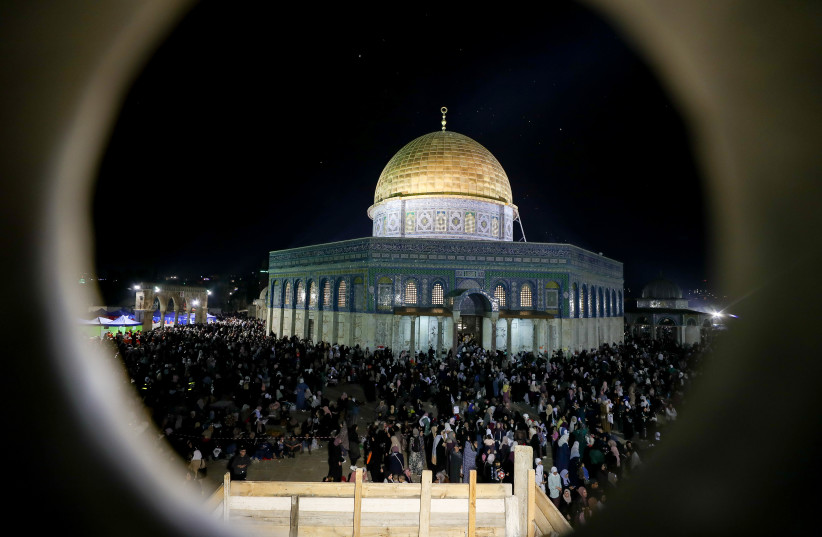Hamas’s failure to exploit Ramadan for terror is a win for Israel, worshippers – editorial
The warnings were dire and ominous. Following the attack of October 7 and the resultant Gaza war, Hamas was going to exploit the holy month of Ramadan to recruit West Bank and east Jerusalem Muslims as part of their terror campaign against Israel.
It wasn’t just a paper tiger either. Two weeks before the March 10 beginning of the holiday, Hamas arch-terrorist Ismail Haniyeh called for Palestinians in Jerusalem and the West Bank to march to Jerusalem’s al-Aqsa Mosque at the start of Ramadan.
Speaking during an assessment at the IDF Central Command ahead of Ramadan, Defense Minister Yoav Gallant warned that Hamas, along with Iran and Hezbollah were planning to turn Ramadan into “the second stage of October 7, and ignite the ground.”
“Hamas’s main goal is to take Ramadan, with an emphasis on the Temple Mount and Jerusalem, and turn it into the second phase of their plan that began on October 7,” he said. “We must not give Hamas what it has not been able to achieve since the beginning of the war.”
Public Security Minister Itamar Ben-Gvir presented a plan to severely restrict Muslims, including Israeli Arabs, from entry to the Temple Mount during the month. According to his program, only worshipers over 70 would be allowed to enter.

That plan, initially endorsed by Prime Minister Netanyahu, prompted a huge backlash from the Muslim world amid threats of even more violence if it was implemented. It was eventually shot down, after opposition from the Israeli security apparatus including the police, the IDF, and the Shin Bet (Israel Security Agency). The discussion concluded that entry for Palestinians will follow the previous years’ regulations.
Knesset member Mansour Abbas commended Netanyahu at the time for the “responsible decision to allow freedom of worship for Muslim worshipers at al-Aqsa Mosque.” He urged the Arab public to exercise their right to prayers and fulfill their religious duties during the holy month while upholding law and public order.
Netanyahu emphasized Israel’s commitment to preserving freedom of worship for all religions. He assured that appropriate security and safety measures would be in place to allow the Muslim public to celebrate the holiday while maintaining law and public order.
And lo and behold, despite the Hamas calls for violence and Ben-Gvir’s over-the-top response to restrict freedom of worship, Ramadan, which ends this week with the three-day festival, Eid al-Fitr, has passed peacefully.
Yes, there was a spate of Palestinian terror attacks against Israelis throughout the month but no organized concerted efforts on the level for which Hamas was hoping and Israel was fearing.
This past Friday, some 120,000 worshipers attended Friday prayer, largely without incident, the Islamic Waqf estimated, an assessment backed up by the Israel Police.
Ramadan Fridays end in relative peace
The previous three Fridays of Ramadan, historically the most fraught with potential conflict, also ended comparatively peacefully.
What does this tell us? For one, far and wide the Palestinians of the West Bank and east Jerusalem and the Israeli-Arab population are largely law-abiding and not seeking altercations with Israeli authorities. The attempts by Hamas and other Palestinian extremists to incite them have failed on a large-scale level. The Palestinian people are not buying into Hamas’s narrative and agitation.
This also tells us that the Israeli security apparatuses know how to act with restraint and reasonableness. Given directives to keep the environment as calm as possible and not exacerbate touch points of potential violence, they succeeded with shining colors.
It also tells us that the government, despite containing elements that would decide otherwise, is smart enough to realize that Israel doesn’t need to be fighting on any more fronts than necessary. The relative quiet that Hamas’s calls for recruitment to the cause ever since October 7 has been met with from most Palestinians in the West Bank and Israeli Arabs needs to continue. And a big part of that effort was enabling worshipers to enjoy their freedom, unencumbered by more restrictions.
Israel’s commitment to preserving freedom of worship for all religions was upheld, and the Muslim worshipers behaved in a manner attuned to an awareness that their actions could curtail that freedom.
Both sides won during Ramadan. The big loser? Hamas.





Comments are closed.